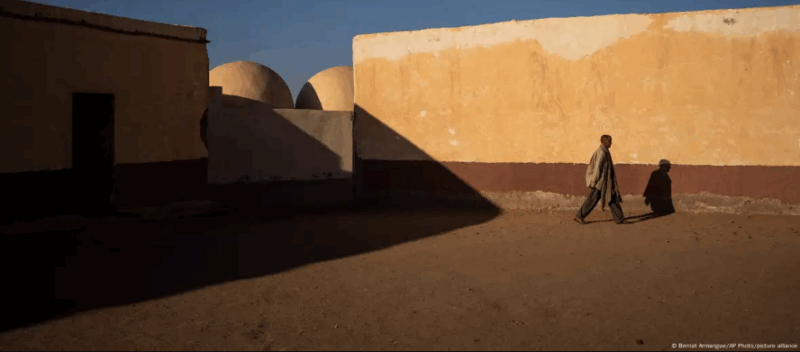The UK has joined other European countries in endorsing Morocco’s position in the Western Sahara conflict. Algeria and the independence-seeking Polisario are losing out.
The UK changed its stance and supports Morocco’s claim on the disputed Western Sahara regionImage: Bernat Armangue/AP Photo/picture allianceThe UK has repositioned its stance in the Western Sahara conflict. According to British Foreign Secretary David Lammy, the Moroccan autonomy plan represents the “most credible” position.
The proposal, which dates back to 2007, is the “most viable and pragmatic basis for a lasting resolution of the dispute,” Lammy said in Morocco’s capital Rabat earlier this week.
These words mark a turnaround from London’s previous support for the UN’s decades-long call for a referendum to determine the future of what it classifies as a ‘non-self-governing territory’. The new position is in line with that of a number of other, predominantly Western countries.
Moroccan Foreign Minister Nasser Bourita welcomed the change of course. According to media reports, the new British position “contributes significantly” to promoting the UN’s path to a “final and mutually acceptable solution”.
In its plan, Morocco outlines an allegedly far-reaching autonomy for the Western Sahara albeit under Moroccan sovereignty.
The change of position is likely to anger Morocco’s regional rival Algeria, which backs the Polisario Front, a movement seeking an independent West Saharan state. In a statement on Sunday, Algeria said Morocco’s proposal was “empty of content and incapable of contributing to a serious and credible settlement of the conflict.”
UK is ‘showing flexibility’
“The British position nevertheless leaves a door open,” Isabelle Werenfels, Maghreb observer at the Berlin-based German Institute for International and Security Affairs, told DW.
“When Foreign Minister Lammy describes the Moroccan proposal as the ‘most credible solution,’ he is not saying that it is the only solution,” Werenfels said. “Unlike France, the UK is holding back in its positioning and is showing flexibility.”
Last summer, French President Emmanuel Macron had called the Moroccan proposal the “only basis” for resolving the conflict.
In doing so, he massively angered Algeria , which is advocating for a complete independence of Western Sahara. Since then, French-Algerian relations have been strained. The move is all the more serious as France is a permanent member of the UN Security Council, political scientist Hasni Abidi from the Geneva-based think tank CERNAM told DW a few weeks ago.
During his first term in office from 2017 to 2021, US President Donald Trump recognized Morocco’s sovereignty over the Western Sahara. This decision ignored the UN’s position on the territory, and paved the way for other countries to follow suit. The recognition also paid tribute to Morocco’s willingness to establish diplomatic relations with Israel.
Then in 2022, Spain, too, started backing the Moroccan autonomy plan, but it’s trying to do so in a similarly balanced manner to the UK.
Prime Minister Pedro Sanchez describes the plan as the “most serious, realistic and credible basis.”
The UK on the other hand is also trying to be diplomatically considerate with regard to the UN, says expert Werenfels.
“London continues to emphasize the relevance of the UN-led political process,” she told DW.
The UN has long been proposing a referendum in which the inhabitants of the region should vote on whether they want to be part of Morocco or independent.
Highly coveted region
Up until 1976, Western Sahara was a Spanish colony. However, when Spain began to vacate its positions, Morocco had already occupied first the northern, then the southern part of Western Sahara.
The Polisario movement, founded in 1973, sees itself as the representative of the Sahrawi people traditionally living in Western Sahara. The movement has been fighting for the independence of Western Sahara with the support of Algeria.
In 1976, it proclaimed the Sahrawi Arab Democratic Republic in the interior of the territory, which is recognized by 44 countries. Shortly afterwards, armed clashes with Morocco’s army began. Almost 50 years later, Morocco’s de facto rule over Western Sahara has not yet been recognized under international law.
Western Sahara is a coveted territory due to its mineral resources. Its phosphate deposits are estimated to be the largest in the world.
Since the 2000s, Morocco has been investing in hotels, beach resorts and leisure facilities to attract tourists, particularly around the city of Dakhla in south-western Western Sahara. An airport has also been in operation there since 1993.
Morocco’s rising clout
The British step could be considered another sign of Morocco’s growing global significance.
For Spain, the main issue is migration, Werenfels says. Refugees have repeatedly attempted to enter Spain and the EU irregularly via the Spanish enclaves of Ceuta and Melilla, located on Morocco’s northern coast. For some time now, Morocco has been tightening its border controls on the two enclaves. According to Werenfels, Spain’s support for Morocco’s position on Western Sahara may well be due to that.
The UK, on the other hand, is likely to have economic interests above all, Werenfels said.
“In 2024, [the UK and Morocco] expanded their trade relations enormously,” she added. According to a report by the Moroccan state press agency MAP, London is said to consider “supporting projects in the Sahara.”
In general, Morocco is becoming increasingly successful as gateway to Africa, Werenfels states. It is also becoming more and more attractive as a production location.
Source: https://www.dw.com/en/new-uk-support-boosts-moroccos-claim-on-western-sahara/a-72817371








